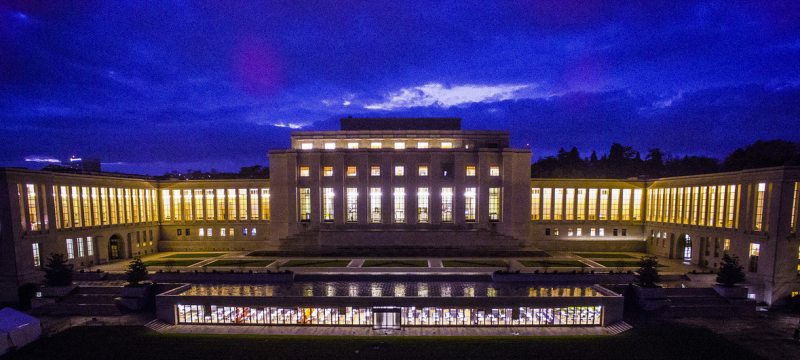UN human rights experts condemn Belarus executions
GENEVA (12 December 2018) — UN human rights experts condemned Belarus for its continued use of the death penalty, following local news reports that the country, in defiance of the Human Rights Committee’s requests for a stay, had executed three people: Aleksei Mikhalenya, Semyon Berezhnoi and Igor Gershankov.
The UN Special Rapporteur on the situation of human rights in Belarus and the UN Special Rapporteur on extrajudicial, summary or arbitrary executions, together with the Human Rights Committee, deplored Belarus’ continued use of the death penalty amid reports that the men had been executed while their complaints were still pending before the UN Human Rights Committee.
"The repetitive failure of Belarus to respect the Committee’s procedures and the interim measures it has issued is simply unacceptable. The fact that such failures occur in the context of capital cases which implicate the right to life, and which the Committee considers to be the ’supreme right’, is particularly unconscionable," said Yuval Shany, Chair of the Human Rights Committee.
Non-compliance with the Committee’s request for interim measures, which is the formal name of the Committee’s procedure aimed at preventing irreparable harm, constitutes a violation by Belarus of its obligations under article 1 of the Optional Protocol to the International Covenant on Civil and Political Rights, to which Belarus acceded in 1992. States which have adhered to the Optional Protocol are obligated under international law to cooperate with the Committee in good faith. The Committee’s requests to Belarus to halt the executions of the individuals are binding under international law.
Reports indicate that Mr. Mikhalenya, who was found guilty of murder and sentenced to death in March 2017, was executed on or around 15 May this year. Mr. Berezhnoi and Mr. Gershankov were both found guilty of murder in July 2017, and were reported to have been executed on or around 19 November 2018.
“Notwithstanding the gravity of the crimes they committed, as human beings these individuals enjoyed an imprescriptible right to life. Keeping their relatives ignorant of the time and circumstances of their death and failing to return their bodies is an additional, useless pain unfairly inflicted to their families,” said Anaïs Marin, Special Rapporteur on the situation of human rights in Belarus.
Since 2010, Belarus has executed 13 people whose cases were under examination by the Human Rights Committee. Belarus remains the last country in Europe and Central Asia that applies the death penalty. In its last report on Belarus published in November 2018 (available in English and in Russian), the Human Rights Committee emphasized that Belarus “should consider establishing a moratorium on executions as an initial step towards legal abolition of the death penalty and ratification of the Second Optional Protocol to the Covenant, commute all pending death sentences to imprisonment and increase efforts to change public perception about the necessity of maintaining the death penalty”.
Irrespective of their executions, the Human Rights Committee will consider the cases of Aleksei Mikhalenya, Semyon Berezhnoi and Igor Gershankov. All three cases contain allegations of torture in detention, forced confessions, denial of access to legal assistance and unfair trial.
Background
The Human Rights Committee monitors States parties’ adherence to the International Covenant on Civil and Political Rights, which to date has been ratified by 172 States parties. The Committee is made up of 18 members who are independent human rights experts drawn from around the world, who serve in their personal capacity and not as representatives of States parties.
Its Optional Protocol, ratified to date by 116 States parties, establishes the right of individuals to complain to the Committee against States which violated their human rights. The Optional Protocol imposes an international legal obligation on State parties to comply in good faith with the Committee’s Views. Further information on the individual complaints procedures before the Committees.
Learn more with our videos on the Treaty Body system and on the Human Rights Committee.
For media requests, please contact Julia Grønnevet in Geneva at +41 22 917 9310/jgronnevet@ohchr.org.
Ms. Anaïs Marin (France) was designated as Special Rapporteur on the situation of human rights in Belarus by the UN Human Rights Council in November 2018.She is a researcher with the University of Warsaw, Poland. A political scientist specialized in international relations and Russian studies, she holds a PhD from Sciences Po, where she studied international public law and comparative politics with a focus on post-communist transformations in Central and Eastern Europe. As a Belarus expert, she cooperated with several European think tanks and contributed analytical reports and policy recommendations for various governments as well as structures, such as the European Parliament and the Eastern Partnership Civil Society Forum. She took part in OSCE/ODIHR election observation missions, including in Belarus. She has published extensively on Belarusian domestic policies.
For more information and media requests please contact: Mr. Alexandre Girard (+41 22 917 9180 / agirard@ohchr.org) or write to sr-belarus@ohchr.org.
Ms. Agnes Callamard (France), Special Rapporteur on extrajudicial, summary or arbitrary executions, has a distinguished career in human rights and humanitarian work globally. Ms. Callamard is the Director of Columbia Global Freedom of Expression at Columbia University and has previously worked with Article 19 and Amnesty International. She has advised multilateral organizations and governments around the world, has led human rights investigations in more than 30 countries, and has published extensively on human rights and related fields.
For more information and media requests, please email eje@ohchr.org
The Special Rapporteurs are part of what is known as the Special Procedures of the Human Rights Council. Special Procedures, the largest body of independent experts in the UN Human Rights system, is the general name of the Council’s independent fact-finding and monitoring mechanisms that address either specific country situations or thematic issues in all parts of the world. Special Procedures’ experts work on a voluntary basis; they are not UN staff and do not receive a salary for their work. They are independent from any government or organization and serve in their individual capacity.


